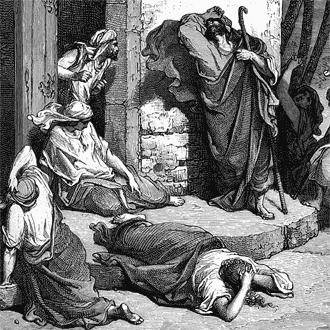Friday, August 11, 2006
The Words of my Groaning (Job 3-7)

The poem begins with Job’s agonized lament where he curses the day he was born. It is a dark parody of the creation of Genesis 1. Job says, “let that day be darkness” and “let the stars of its dawn be dark; let it hope for light, but have none.” If such agony is the product of creation, then darkness is better than light, chaos better than order, and death better than life.
Eliphaz responds with a defense of God’s justice:
Who that was innocent ever perished?Furthermore, what right does man have to complain before God? Here Eliphaz quotes a voice of a great spirit, saying,
Or where were the upright cut off?
Can mortal man be in the right before God?Which spirit would say such a thing we are not told, but the sentiment (wise, rational, and theologically sound as it is) reminds me of the pessimism of Satan in the first two chapters. Eliphaz concludes that Job should accept his sufferings as discipline from the almighty, and trust in God’s future healing.
Can man be pure before his Maker?
Even in his servants he puts no trust,
and his angels he charges with error;
How much more those who dwell in houses of clay,
whose foundation is in the dust,
who are crushed like the moth.
Upon hearing this, Job feels he needs to clarify things. This is not the pain of discipline – these are the poisoned arrows of utter destruction. Oh that God would simply get it over with!
There are some striking similarities with Psalm 22. Job’s groanings are “poured out like water” and he reflects in agony on the day of his birth. His friends smugly assert that God would rescue him if indeed He delighted in him. It makes me think about how Christ’s suffering may lie at the heart of the mystery of Job, and indeed of any theodicy. A righteous man suffers the brunt of God’s wrath: a profound mystery indeed.
Comments:
<< Home
"It makes me think about how Christ’s suffering may lie at the heart of the mystery of Job, and indeed of any theodicy."
I'm with you on this. Glad you introduced Christological themes already (like Psalm 22), because to me all talk of suffering has to be filtered through the mystery of the Cross, and the fundamental truth that no redemption occurs without innocent suffering.
I'm with you on this. Glad you introduced Christological themes already (like Psalm 22), because to me all talk of suffering has to be filtered through the mystery of the Cross, and the fundamental truth that no redemption occurs without innocent suffering.
I like your comment on how ch. 3 reflects on creation - negation of light, star that are supposed to measure our days. I also see the point of comparison with Ps 22. My only reluctance is that we don't run to the end of the text book for the answers before we have done our homework - that is that we sufer though the struggle of the arguments. I am pursuing Job and Wisdom Literature partially as a way to understand and then to engage with post-christian folk who have so far refused to go to the end of the text for the answer. Maybe for them we need to feel a bit of the abyss.
Post a Comment
<< Home
Home
Who is Oyarsa?
Contact Me
Blog the Bible
Recent Comments
Archives
- June 2006
- July 2006
- August 2006
- September 2006
- October 2006
- November 2006
- December 2006
- January 2007
- February 2007
- March 2007
- April 2007
- May 2007
- June 2007
- July 2007
- August 2007
- September 2007
- October 2007
- November 2007
- December 2007
- January 2008
- February 2008
- March 2008
- April 2008
- May 2008
- June 2008
- July 2008
- September 2008
- October 2008
- November 2008
- July 2009
- August 2009
- January 2010
- August 2010
Recommended Books
